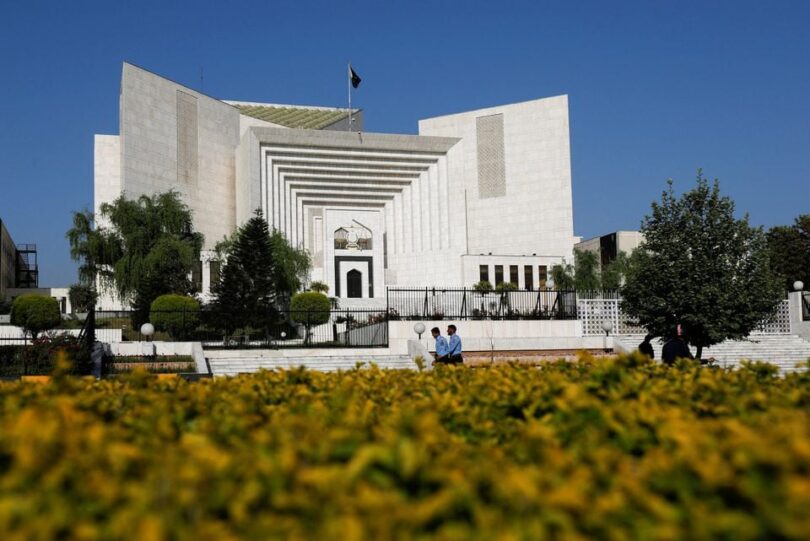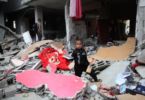On Wednesday, the Supreme Court (SC) constituted a nine-member bench headed by Chief Justice of Pakistan Umar Ata Bandial to hear cases against civilians’ trials in the military courts. The jury comprises Justice Qazi Faez Isa, Justice Sardar Tariq Masood, Justice Ijazul Ahsan, Justice Mansoor Ali Shah, Justice Muneeb Akhtar, Justice Yahya Afridi, Justice Mazahar Naqvi, and Justice Ayesha Malik. Earlier, prominent lawyer Aitzaz Ahsan, Justice Jawad S Khawaja, several social activists, and political workers approached the apex court to examine the prosecution of civilians in the military courts. The Petitioners pleaded with the court to annul sections 2 and 59 of the Army Act, notify section 94 and rules unlawful, and declare civilians’ trials in military courts unconstitutional.
The saga of military courts is unceasingly resonating in all nooks and corners of the country. At the same time, this issue has become one of the burning topics for prime-time TV talk show, scholarly debates, and political discussions in Tea bars, libraries, and public gatherings in all parts of the nation. The PTI-led opposition is increasingly inserting pressure on the governments, military as well as senior judiciary through continuous lobbying and engagement with foreign media, bar associations, civil society, and human rights groups to get freed its workers/supporters involved in May 9 violence and attacks on military installations. Several lawers leaders and human rights activists termed the trials of civilians in the military courts unconstitutional and filed petitions in the apex court to revoke the government’s decision. The critics are of the view that the government must not drag the military into the political and controversial issues and rioters should be tried in the Anti-Terrorism Courts (ATC) as they committed violence and terrorism against civilians as well as military targets/ installations.
Realistically, the case of rioters’ trials in the military courts is a complex issue, that needs an evaluation from several perspectives including the determination of its legality, the contradiction to fundamental citizenry rights, accused rights to appeal in the higher courts along with the judicial appreciation of the provisions of the Army Act in the light of May 9 events and overall scenario in the country. The senior judiciary also considers the military courts a risk to its independence and a serious hazard to civilian supremacy in the country. The bar and civil society are urging the apex court to protect its domain and not to backtrack from its constitutional role as the trials of civilians in the military courts do not meet the international standards, violate the people’s right to a public hearing, fair trial, and judgment amid heightened confidentiality and an opaque trial of the accused.
Currently, this legal subject has become a political dispute and a matter of the ego for the ruling government and the military establishment that originated this issue and resolutely pursued trials of civilians in the military courts. The situation is likely to become more complex after military courts announce verdicts and their decisions be reviewed by the higher courts in line with the constitution. Historically, the role and domain of military courts and military adjudicators are very limited and conditional, while the political nature of the case further complicated the situation and made their work more difficult and controversial. At the helm of prevailing confusion and ambiguity, the competing groups are satisfying their grudges against each other while the coalition government is tactfully using May 9 events against its staunch adversary. Thus, the ongoing political wrangling between the government and the opposition is seriously undermining the country’s economy, national unity, and cohesion.
The Chief Justice of Pakistan has constituted a larger bench to examine the case of civilian trials in the military courts, while relevant military laws would also come into consideration by the competent and most powerful bench of the Supreme Court which comprises the current Chief Justice as well as the nominated future Chief Justice of the Apex Court, Justice Qasi Fiaz Esa. This is an important and great idea that the two senior-most judges who often choose to stay on the opposing poles will review the most sensitive case in the country’s history. The current government intends to settle its score with the PTI by using military establishment and covering extra mileage against its opponents by trying opponents in the military courts. Otherthe, the ruling elite has nothing on its credit except the baggage of corruption and making a mockery of public issues. The Chief Justice has made a larger bench to shed off blame for any partiality and favoritism, however, the bench members have conflicting ideologies and diverging interests in the prevailing situation in the country. The court and adjudicators will face a great challenge in securing the constitution, protecting the dignity of the judiciary, and overcoming their internal differences and biases. Will the credibility of the justice system in Pakistan be restored if the decision is made in favor of military courts? Whether judicial activism will prevail against the military courts, or the judges will reinvent the theory of necessity once more.
Unfortunately, the 9-member larger bench collapsed before the commencement of the hearing as Justice Qazi Faiz Esa and Justice Tariq quit the jury, amid fear, apprehensions, and doubts. Apparently, the judges failed at an early stage of their examination, while the remaining seven-member bench kicked off the hearing of the case on Thursday.
There are different views, multiple scenarios, and countless assumptions regarding the forthcoming verdict in the case regarding trials of civilians in military courts. But ultimate justice has always been a need of the countries around the globe that guide leaders and set the course for the nations. Therefore, the public and both contesting groups must have good faith in the judiciary that will surely rescue the nation at this crucial point in history.







